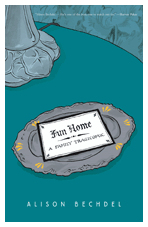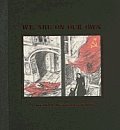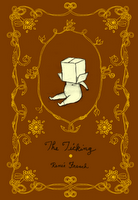Graphic Lit: Female cartoonists
Gah. Finally able to breathe again. Here's the Graphic Lit column from 6/16
Gender has been a big issue in the comic book blogosphere lately.
The biggest news is probably DC’s announcement that the new Batwoman will be (according to the New York Times) a "lipstick lesbian."
Elsewhere, gripes have been heard concerning a new book on obscure cartoonists that it conveniently focuses on white males.
The good news is that’s not a claim you could make today. The past two months have seen some fabulous books from a variety of female artists, each one more different from the last. If anything, it proves that women cartoonists are no longer a ghetto unto themselves, but a thriving, vital part of the comic book industry.
Here’s a look at five of the more notable titles:
by Alison Bechdel
Houghton Mifflin, 240 pages, $19.95. 
Nothing in my little exposure to Bechdel’s previous work ("Dykes to Watch Out For") had prepared me for this stunning memoir detailing her strained relationship with her controlling, emotionally distant father.
What’s interesting about the book isn’t just the details, which are gripping, but how Bechdel lays it out.
All the major revelations — her father’s premature death, his double life, her own coming out — are revealed within the first few chapters. Bechdel then returns to these stories again and again, circling around them and adding more details until a full picture of how she and her father influenced each other is formed.
Autobiographical stories are a dime a dozen in the graphic novel market these days, but "Fun Home" easily rises above the rest through Bechdel’s unique and compelling storytelling abilities. Expect to see this book make a lot of best-of lists at the end of the year.
by Miriam Katin
Drawn and Quarterly, 136 pages, $19.95. 
Speaking of great memoirs, here’s another one, by the relatively unknown Katin, who has worked mainly in animation and children’s books.
Here, she details her childhood around the last year of the Second World War, when she and her mother were forced to flee their home in Hungary and adopt a hand-to-mouth existence in the countryside, their lives entirely dependent upon the kindness (or cruelty) of strangers.
A very young child at the time, Katin portrays her confusion at their forced wanderings, which serves as a nice counterpoint to her mother’s desperation. She also effectively employs a loose, sketchy style that effectively undercuts the hardscrabble nature of the story she’s telling.
by Renee French
Top Shelf, 216 pages, $19.95. 
No other cartoonist is able to creep you out and break your heart as eloquently as Renee French, often on the same page.
"The Ticking" is French’s latest work, and might just be her most emotionally resonant yet. The plot involves Edison Steelhead, a deformed boy who lives with his equally disfigured father on a remote island — presumably to avoid the stares of the general populace. When Edison decides to take his chances with the outside world, however, tragedy occurs.
What’s especially remarkable about the book is the way that small details that initially seem insignificant gain larger resonance while other mysteries are seemingly left unexplained. This is a book that rewards frequent readings.
by Megan Kelso
Fantagraphics Books, 152 pages, $16.95. 
"Squirrel Mother" collects several of Kelso’s short tales accumulated over the past few years, and it’s interesting to see how she subtly alters her style — a bit more cartoony here, a bit more stylized there — in order to fit the emotions of each tale.
Like French, Kelso is an artist whose themes are often revealed in the minor details and background scenes. A scene of two girls learning the waltz, for example, takes on added resonance when you notice a "for sale" sign in the one girl’s yard.
Unlike French, though, Kelso’s work is more suffused with melancholy than dread. Her work is about the small moments in life that reveal a great deal about where the characters have been and where they’re going.
by Jessica Abel
Pantheon Books, 276 pages, $19.95. 
This is probably the weakest of all the books reviewed here, but that’s not due to lack of ambition. "La Perdida" tells the story of Carla, who moves to Mexico to explore her Hispanic roots and so heedlessly tries to assimilate that she starts hanging out with a rather dangerous crowd. And things get worse from there.
Part of the problem with Abel’s story is that it’s hard to identify with any of the characters, so unlikeable are they. Carla in particular is so desperate and needy that you’re hard-pressed to believe she can’t see the obvious danger she’s putting herself into.
Still, Abel has proven herself to be a top-notch artist and there are moments where "La Perdida" sings. Perhaps it’s not the magnum opus Abel clearly wants it to be, but neither is it a utter failure.
Copyright The Patriot-News, 2006

2 Comments:
I have to be honest, the best books, comics and strips, I've read have all been written by women. I don't know if there is a particular reason for that but women have a way to write that just appeals a great deal to me.
So, I don't actually believe this will have effect.
Post a Comment
<< Home